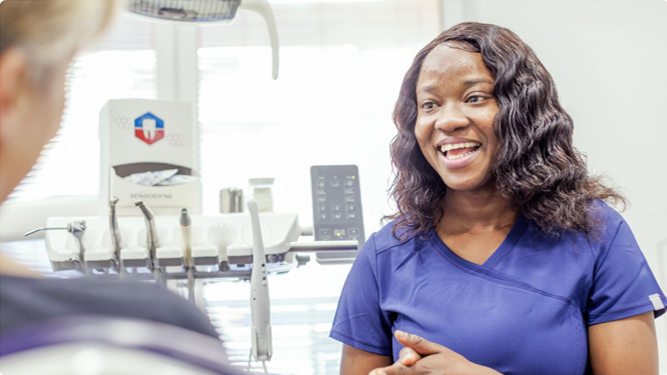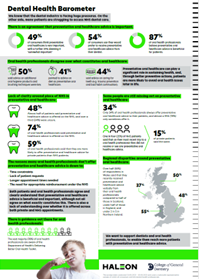
World leading consumer health company Haleon, in conjunction with the College, has launched the ‘Dental Health Barometer’ to provide insights into the role of preventative oral healthcare in the UK.

Preventative care is defined as proactive dental care and advice that helps a patient to take action to maintain a healthy mouth, protecting against tooth decay, gum disease and more serious issues such as tooth loss and negative impacts on general health.
However, the survey of UK consumers and dental health professionals reveals that preventative oral care advice is not being offered consistently to patients. That’s despite a high incidence of tooth decay – with 70,000 people treated in UK emergency departments for the disease last year alone[1]. Just one third (34%) of oral health professionals said they always offer preventative care advice to patients, while one in four (25%) patients said they weren’t given preventative advice during their last dental appointment.
Over half (59%) of oral health professionals said that they are more likely to offer preventative advice for private patients than NHS patients, and over a third (37%) of NHS oral health professionals cited time constraints as the top reason for not being able to routinely offer preventative care advice, as opposed to just 15% of private oral health professionals. Though we know oral health professionals are working hard during a time of unprecedented pressure on the UK dental landscape, these figures come as little surprise given the widely reported ‘dental deserts’ where some areas of the UK have over 3,000 patients for every NHS dentist[2].
Additionally, oral health professionals differed on the preventative advice they would recommend to patients. While half (50%) said advice on additional oral hygiene products and brushing techniques were key, only 2 in 5 (41%) pointed to advice on diet as preventative care and just over a third (34%) would consider advice on caring for gums to be preventative advice.
Bas Vorsteveld, General Manager GBI, Haleon, said: “We know that oral health professionals are facing huge pressures, and we want to help support them to be able to provide better preventative advice – not just during routine dental appointments, but outside of appointments too. Our findings revealed preventative care advice is not always offered consistently, despite patients and dentists understanding its importance. We remain committed to addressing these issues and will look to develop new initiatives to support dental professionals.
“These will form alongside our existing initiatives which include providing educational materials to healthcare professionals, continuing to innovate and provide therapeutic oral care for patient issues at home and through campaigns like Shine Bright which raises awareness in children of the prevention of oral health conditions.”
The importance of preventative care
Nearly half (49%) of the UK public think preventative care for oral health is very important with over half (54%) of consumers saying they would prefer to receive preventative care advice for their oral health from their dentist. Meanwhile, the majority (87%) of oral health professionals think that preventative action is beneficial and aim to provide it proactively.
Confusion over the availability of preventative care on the NHS
However, there is a lack of understanding across consumers and oral health professionals over whether preventative care is routinely available on the NHS. Almost half (48%) of consumers said preventative oral healthcare advice is offered on the NHS, and over a third (34%) were unsure. Oral health professionals were more aware, with 74% saying preventative oral healthcare advice is offered on the NHS. Once again, younger dentists are more aware that preventative care advice should be routinely available on the NHS.
The importance of preventative care has already been acknowledged by the Department of Health, through the roll out of the Delivering Better Oral Health toolkit, which was updated in 2021. This aims to provide best practice guidance on routine preventative care. It is encouraging that over a quarter (76%) of oral health professionals surveyed were aware of this toolkit. Younger dentists are more likely to be aware of it, with 82% aged 23-34 were aware compared to 58% of dental health professionals aged 45 – 54.
Dr. Kate Fabrikant, Medical Affairs Director, Northern Europe, Haleon, further supports this: “Working in the industry, we must find ways to support the availability and accessibility of preventative oral care for all. We will continue to support dental professionals in facilitating behavioural change towards better oral health in their patients, whilst improving health literacy of the patients to seek out and engage in preventative care, to help them practice better everyday self-care and avoid longer term dental issues. There is a long road to travel to normalise healthy smiles in society, and it will take professionals, industry and policy makers coming together to get to this end goal.”
Consumers are open to preventative advice, but guidance is needed
The study found patients have a strong level of trust in advice given by their dentist. Where it is offered, 9 in 10 (88%) found the advice helpful. The study found that NHS patients, younger people and men were less likely to proactively ask for preventative care advice.
Dr Abhi Pal, President at the College of General Dentistry said: “We are committed to quality and standards of excellence in general practice dentistry – helping professionals to do the best for their patients. The research revealed some fascinating insights into the role that preventative care plays in the UK. It’s quite properly a mainstay of both private and NHS appointments, and we support any initiative that promotes prevention.”
Regional split
The Barometer also found that there were regional discrepancies between both patients and oral health professionals. It was found that:
- Only 40% of consumer respondents from Greater London think that preventative care is very important for oral health compared to over half (55%) in Northern Ireland and South West England.
- Respondents from Greater London also were less likely to have received advice, with only 37% having encountered preventative care advice compared to over half of respondents (55%) in the South East and nearly half (47%) in the North East.
- Over half (55%) of respondents in Wales said thinking back to their most recent trip to an oral health professional, they received preventative care advice verbally from them,
- compared to 50% of those in Scotland,
- 48% of those in England,
- And under 2 in 5 (37%) in Northern Ireland
- Northern Ireland have recalled a particularly low level of preventative care during dentist visits – with only slightly over a third of respondents (37%) having received advise at their last appointment. Despite this, the respondents from the region were some of the most interested in learning about preventative advice (53%) compared to (36%) of East England, West Midlands and Yorkshire and Humber who were less interested.
- The East of England saw the lowest level of detail from their oral health professional on preventative care advice, with only 30% feeling their dentist provided a lot of detail.

A poster depicting the key findings of the research is available to download here.
[1] https://www.telegraph.co.uk/news/2023/10/23/tooth-decay-patients-ae-nhs-dentist-shortage/
[2] https://www.libdems.org.uk/press/release/rise-in-dental-deserts-leaves-millions-struggling-to-get-nhs-dentist-appointment

